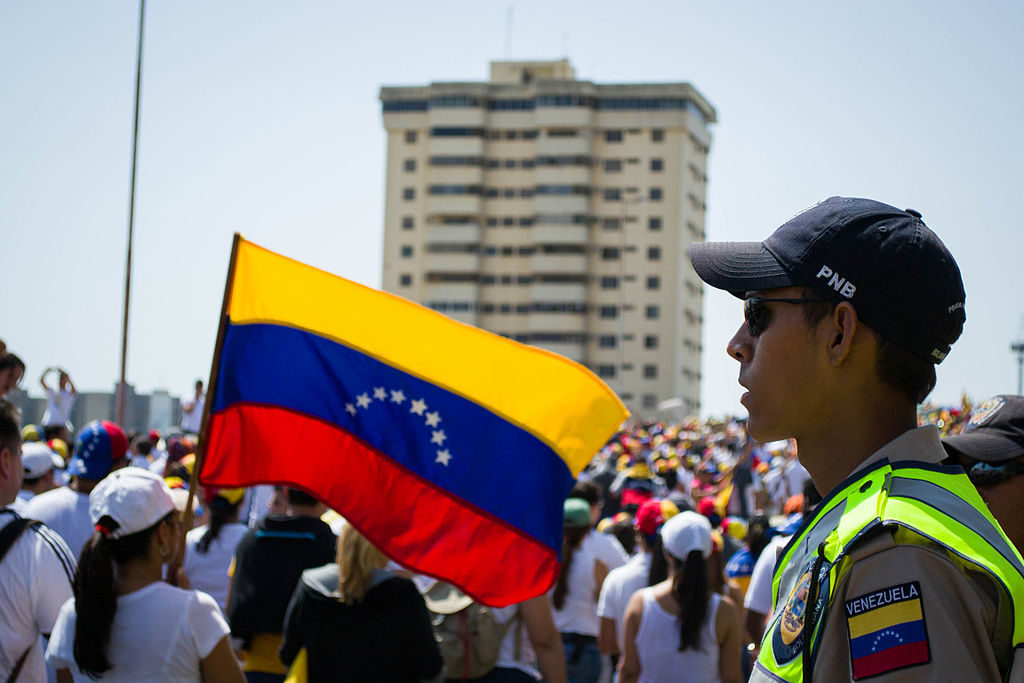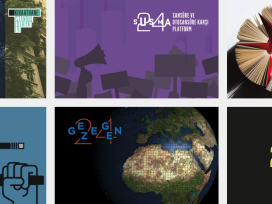Venezuelan-Norwegian Thor Halvorssen started the ninth edition of his Oslo Freedom Forum (OFF) in May 2017 by bringing up the anniversary of Thailand’s military coup, in addition to authoritarian North Korea, Venezuela, Zimbabwe, Saudi Arabia and Turkey.
In his opening remarks, he recalled the global crises, wars and conflicts where ‘65 million people are fleeing, about 280 million are affected by natural catastrophes, 793 million lack clean water and 836 million live in abject poverty.’ He added: ‘However, authoritarian regimes, dictatorships and democratic autocracies impact more people than all of the above put together. Which is more than half of the world’s population. This is what this year’s OFF is all about.’
Halvorssen stated: ‘In our opinion, a true democracy has the following: freedom of speech, an active civil society, separation of power, and fair and free elections.’

Thor Halvorssen. Source: Flickr
Background
Four days later, Modern Times Review met up with the OFF leader for an in-depth conversation. The motivation for his long term work for freedom and human rights is rooted in the experiences of his parents: his Norwegian father was falsely accused and imprisoned as a political prisoner until Amnesty and others finally managed to free him. Halvorssen’s mother fared worse. Some 13 years ago, he witnessed her being shot by the Venezuelan authorities, during a peaceful demonstration against President Hugo Chávez and his politics.
‘The way I saw the event live on TV, I thought she had died. It caused me indescribable amounts of pain and anguish and a sense of unfairness. As a consequence, I bond naturally with people who have suffered this kind of violence – it does not matter where you were born or with what privileges. When someone you admire or care for is attacked, we understand what it is like to live in a country where authorities do not abide by the law. Even senior citizens, who only expressed their opinions during a non-violent demonstration, were attacked by the state. My grandparents were also present.’
Following this experience, Halvorssen wanted to establish the Human Rights Foundation – also because of his frustration over ‘Amnesty and International Human Rights Watch’s lack of focus on Venezuela – as Chávez-sympathisers’.
But, why hold an Oslo Freedom Forum, here on the other side of the globe?
‘Because Norway puts human value high and has never incited war.’
The fact that his father was Norwegian is irrelevant, although the 41-year old Venezuelan reminds me that those of us who are born into freedom in Norway ‘have a responsibility to not forget those who incidentally do not grow up with the same opportunities’.
Individuals
The conference strategy was, as before, to present a series of witness statements from vulnerable individuals: ‘We believe, although this may sound strange to the collective mentality of Norwegians – that individuals really achieve things; that the truth is that individuals, not the group, is at the centre of society.
Individuals make a difference. Someone else who spoke during the conference was Charlie Chaplin himself – in an extract from his film The Dictator (1940). Chaplin makes fun of Hitler’s use of mass suggestion; he talks about the dignity of life and that soldiers must not allow themselves to be subjugated into violence or blind aggression. Halvorssen introduced the excerpt by explaining the risks Chaplin had to take, and that he was forced to finance the film himself as The Dictator was banned at the onset of World War II. The enormously popular film was smuggled into France, where several soldiers – when they realised what they were watching – shot the screen to pieces.
Halvorssen has a vested interest in films. He has made several through his company Moving Pictures Institute – films aimed at promoting freedom: ‘But OFF is also a combination of politics, research, film and art. Early on, totalitarian movements understood the importance of films to influence people. We, the protesters, also know that truth and good ideas may need the help of a film. That is why we make the speeches here in Oslo into short films and spread them worldwide.’
I ask him about the witness statements of these individuals – whether the organisers also realise to whom, and what values they are providing a stage. ‘We do a series of investigations of every single person we want to invite; every single tweet or message they have published, we study every book or article they have written. Anyone who has defended the use of violence is not welcome as a guest here.’
Venezuela
We talk about Venezuela, although Halvorssen insists that he is not actively involved in its politics: ‘In Venezuela, the government spreads news of an imminent coup that is likely to happen any time. This is how Turkish [President] Erdogan recently gained enormous power – following the military ‘trying it on.’ Every authoritarian system requires lies.’
Halvorssen is very critical of the Norwegian press coverage of Venezuela: ‘In 2010, we issued a public warning about the ongoing Venezuelan crisis, with children dying from hunger, and suffering due to malaria; the death rate in the capital Caracas was the highest in the world. During Chávez’s presidential period, more people died than the number of people who were killed by the FARC guerrillas in Colombia!’

March to the Palace of Justice of Maracaibo, Venezuela. Source: WikiMedia
We broach the corruption accusations: ‘Chávez stole as much money as the Norwegian Oil Fund possesses – over 1,000 billion US dollars disappeared. Before he gained power, no one starved, even when the price of oil was just seven dollars a barrel. So why did more people become poor under Chávez, as the oil price rose to 115 dollars? During Chávez, the National Health Service also disappeared. He blamed financial breakdowns. The government’s lies are obvious and plentiful.’
Halvorssen asks me how Norwegian journalists, ‘who defended this regime which caused so much destruction, are able to look at themselves in the mirror’. He lists journalists who defended Stalin, Mao and Pol Pot. I am keen to know where Halvorssen stands in relation to the Venezuelan opposition, who now demand a new election or the removal of President Maduro, who recently attempted to close down the national assembly through changes to the Constitution. Does Halvorssen support Julio Borges, the leader of the National assembly, or the presidential candidate for the opposition, Henrique Capriles? ‘No, I am not involved in Venezuelan politics other than in general. Otherwise, people would immediately react and say: “Oh, so you are from Venezuela, you must have money invested there!” I do not like the candidates, nor the politics of those you mention. No, my focus is on other countries such as North Korea, Ecuador and Singapore, where I cannot be accused of having investments. Instead, I am interested in explaining dictatorships.’
Anarchism
Do many people not consider anarchism to be the opposite of a totalitarian dictatorship, I ponder. The foundation of anarchism, as in the works of Norwegian author Jens Bjørneboe, is freedom and solidarity. Brotherhood. I mention that, within today’s more pragmatic anarchism, criticising the suppressing state remains prominent.
What does Halvorssen really think about anarchy? ‘Freedom has always been the concern of anarchy. But I’m not sure if we are really ready for anarchy, in the deepest understanding of the word. Even with totalitarianism as its opposite, anarchy is seen as the absence of order, and it would demand that people respected others and would not steal or harm anyone.’ In other words, we cannot stop locking our doors. However, Halvorssen does imply that we will, perhaps in 200 years, have a society in need of less governmental control ‘because we have become less violent – in a time where biology, science and technology have made life easier.’
‘I am not talking about Communism,’ he says: ‘The point is, if you eat too much you get sick. There is only so much you actually need.’
I point out that anarchists do not want a state power, instead they want to be left alone from state control and governing. You gather together in small societies or networks of likeminded, affinity groups, less dependent on the nation state. ‘Individuals make a difference.’
Halvorssen asks why I am wearing a black shirt – am I an anarchist? Critical voices in Norway often wear black, I reply. But, back to anarchy as an idea. I state that certain interest groups and minorities must be protected from today’s majority and the state, to which Halvorssen replies: ‘Every considered crime is perpetrated by those who say they will look after everyone. I believe that our best hope is the dissolution of nation states and replacing them with city states with more opportunities.’ He concludes on the topic by commenting that ‘states should stop hindering people who strive for a happy life.’
Authoritarian regimes
The philosopher Noam Chomsky mentioned, when I interviewed him some time ago, four essential forms of freedom: freedom of speech, freedom of religion, freedom from fear and freedom from hardship. But, he also spoke of a fifth freedom (which he attributed to the USA) – the freedom to suppress others.
I ask Halvorssen how it would then be possible to end authoritarian regimes: is intervention the way forward, like in Afghanistan, Iraq and Libya? ‘If you truly insist on removing authoritarian regimes, the best way is to enable their own civil society to do it. For instance, we in the OFF are working on informing the North Korean population – by smuggling in tiny memory sticks containing films and other pieces of information – so that they themselves will be able to react.’
Thor Halvorssen resides both in New York and Los Angeles, so I am interested to hear what he thinks of President Trump. ‘I enjoy asking people who are worried about President Trump: Where were you in the eight years before he was elected? It is the power of the government itself you should really fear. They monitor you, so you should monitor them: Watch where the money goes, to whom, and what their interests are,’ he says.
Fiat money
As Modern Times Review has featured pieces on ‘the state’s monetary printing press,’ I mention the fiat system (whereby central banks can freely print money) to Halvorssen: ‘I can hardly believe that you mention fiat money! How many Norwegians really know what this is about? Fiat money from the governments is a frightening system where the money comes with no guarantee, but is instead just based on trust in the system. Everything will collapse if the bubble bursts.’
Many have predicted that the 2009 financial crisis was just a taste of what is to come out of the world economic scenarios: ‘You need only to look at Venezuela, where this tragedy is playing out as we speak. When I was 12 years old, one US dollar in Venezuela cost the equivalent of four Norwegian Kroner (NOK; in Norway, the price was eight NOK). Today, almost 30 years later, one dollar costs almost 400 million NOK in the currency of that period. This terrible hyperinflation was caused, to a great extent, by the Chávez government. Inflation is the government’s way of stealing from poor people, and from unsophisticated people unfamiliar with finance.’
Defending democracy is to simultaneously fight the authoritarians: ‘Authoritarian regimes live, as mentioned earlier, on lies: The Nazis advocated the lie about the Jews so they could act as they did. Soviet communists maintained the lie about Trotsky for a long time – that everything that went wrong was because of him. After his death, they needed a new lie. North Korea’s lie is the war, that the South would attack the North, and that therefore their ‘Dear Leader’ must have all the support he demands and take freedom away from the people ‘to protect them’. But, it was the North that originally attacked the South, not the other way around.’
Meritocracy and inheritance
Towards the end of our hour-and-a-half-long conversation, I try out some thoughts that are not about suppressing the elites. What about meritocracy as a possible uncorrupted system – where various ‘merits’ give value and position, meaning abilities, experience, knowledge and wisdom? Halvorssen joins in: ‘You could ask, if your mother was really ill, would you not want an experienced doctor? If someone were to advise you on economics, should he not be good at mathematics? In Venezuela, we now have a former bus driver as president, and we can see where that is taking us. Chávez was a charismatic leader, but with an encyclopaedic ignorance – a really dangerous combination.’
Meritocracy is not solely about what money you have at your disposal, or how you are financed – something which Halvorssen was chastised for. He agrees: ‘We live in a society where certain individuals are extremely physically fit and can run faster and lift heavier than the rest of us. Should they be put in chains? If someone is more beautiful than the average, do they have to wear a mask? If someone has perfect vision, should you ruin it a little? Or, when it comes to money: if you possess a lot of it because you work hard or save diligently, should you be penalised for this? Money can be put to use towards issues you care about, like the environment, or saving the whales. You could fight against child marriage, or promote vegetarian food to an unhealthy society – and money helps.’
Equality
Beyond liberty and brotherhood, I finally add equality, the third, white colour in the flags of many a state: do you actually have equal opportunity, if a small number of people inherit large sums of money, which is not really a sign of their own ‘merit’? Inheritance gives an advantage, and I do not only mean on the Norwegian property market. The temperature is heating up; Halvorssen has himself inherited. He becomes very engaged in our discussion, and asks whether I believe that the government is really equipped to look after people’s money. He is sceptical about how state employees use money, and mentions all those who jet around the world first class: ‘Only a few days ago, the Norwegian media revealed that the World Health Organisation spends more on first class tickets than it does on fighting AIDS.’
In this way, Halvorssen has, with OFF, shown himself to be a good capitalist. His golden rule is to give away more than what he spends on himself. Nevertheless, I ask him again about inheritance, and he replies: ‘It is one thing growing up in abject poverty and working intensely your whole life to ensure that your descendants will lead a better life. Do you believe that the state should just take your inheritance away from them?’
Although Halvorssen did receive a significant inheritance, he also made his own money. He concludes: ‘Wealthy people should not give their children more than just enough to be free and live genuinely. Bill Gates is an example of that. My children will not get so much that they do not need to work for themselves – just enough to get an education, or receive good care if they fall ill. If you give them too much money, you could ruin them as a person.’








